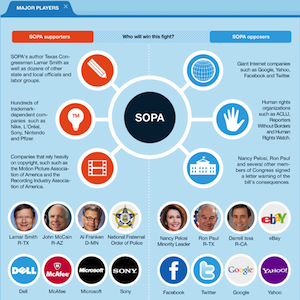
The bill, introduced by Rep. Lamar Smith in late October, gives both the U.S. government and copyright holders the authority to seek court orders against websites associated with infringing, pirating and/or counterfeiting intellectual property. So for example, a website that provides a collection of links to sites that illegally stream copyrighted video content could get shut down and taken to court under SOPA, despite the fact that the site isn’t streaming the content itself.
[aditude-amp id="flyingcarpet" targeting='{"env":"staging","page_type":"article","post_id":362459,"post_type":"story","post_chan":"none","tags":null,"ai":false,"category":"none","all_categories":"business,media,","session":"C"}']If the government had the sole responsibility of policing websites that violated copyrighted intellectual property, it would be a much different scenario. However, because the copyright holders also get to enforce the law (under SOPA), it allows them to push around anyone who may compete with them under the guise of upholding the law. Giant media companies — music labels, television networks and movie studios in particular — could easily take advantage of this situation.
The U.S. House of Representatives is scheduled to debate changes to SOPA Dec. 15. Below is a very helpful infographic that illustrates how SOPA came into existence and what it could mean for innovation if passed. [Click the image to enlarge.]
AI Weekly
The must-read newsletter for AI and Big Data industry written by Khari Johnson, Kyle Wiggers, and Seth Colaner.
Included with VentureBeat Insider and VentureBeat VIP memberships.
[Infographic via BusinessInsurance.org]
VentureBeat's mission is to be a digital town square for technical decision-makers to gain knowledge about transformative enterprise technology and transact. Learn More